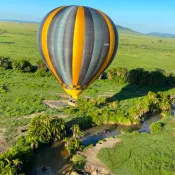Malaria Prevention for East Africa Travel
As a tourist, one of the top health concerns when planning a trip to East Africa is malaria prevention. Malaria remains a significant health risk in many tropical regions, including Tanzania, Kenya, Uganda, Rwanda, and Zanzibar. However, with the right precautions and preventive measures, you can significantly reduce the risk of contracting malaria and ensure that your holiday is as safe and enjoyable as possible.
In this blog post, we will answer some of the most frequently asked questions from our guests—especially regarding malaria prophylaxis (medication), its side effects, and whether it’s crucial to take these medications, particularly when traveling with children under 10 years old.
Why is Malaria Prevention Crucial in East Africa?
Malaria is transmitted by the bite of Anopheles mosquitoes and is endemic in many parts of East Africa, including Tanzania, Kenya, Uganda, Rwanda, and Zanzibar. According to the World Health Organization (WHO), malaria remains one of the leading causes of illness and death in sub-Saharan Africa.
In malaria-endemic areas, taking preventive medication, known as chemoprophylaxis, is vital for minimizing the risk of infection. Malaria is treatable, but prevention is far better than dealing with an infection while traveling.
What Are the Recommended Malaria Prophylaxis Medications?
There are several malaria medications recommended by the WHO and other health organizations, including Doxycycline, Malarone (Atovaquone/Proguanil), and Chloroquine. Each of these medications has its pros and cons, and your choice will depend on your travel plans, your health, and the age of any children accompanying you.
Let’s dive into the two most commonly recommended options: Doxycycline and Malarone, and also discuss Chloroquine, which is less commonly prescribed today due to resistance in many malaria-prone regions.
- Doxycycline (Doxacillin)
Doxycycline is one of the most widely prescribed options for malaria prevention. It is a type of antibiotic that prevents the malaria parasite from multiplying in the bloodstream.
- How It Works: Doxycycline is taken daily, starting 1-2 days before entering a malaria zone and continuing for 4 weeks after leaving the area.
- Side Effects: Common side effects include nausea, stomach upset, and increased sun sensitivity (photosensitivity), which can lead to sunburn. To minimize side effects, take Doxycycline with food and plenty of water. In rare cases, it can cause yeast infections or an upset stomach. Most side effects are mild and go away after a few days of use.
- WHO Recommendation: The WHO recognizes Doxycycline as a highly effective malaria prophylactic drug in endemic regions. However, it’s important to note that Doxycycline is not recommended for children under 8 years old due to the risk of permanent tooth discoloration.
- Malarone (Atovaquone/Proguanil)
Malarone is a combination of two medications—Atovaquone and Proguanil—that work together to prevent malaria infection.
- How It Works: Malarone is taken daily, starting 1-2 days before entering a malaria-prone area and continuing for 7 days after leaving the area.
- Side Effects: The side effects of Malarone tend to be mild and include headaches, stomach upset, and nausea. These side effects are generally short-lived and subside once you stop the medication. Malarone is often preferred for travelers due to its relatively low side-effect profile.
- WHO Recommendation: According to the WHO, Malarone is one of the preferred choices for malaria prevention, particularly for children and travelers who experience side effects with other medications. It is safe for children, and many healthcare providers consider it the best option for families traveling with young kids, especially for children under 10.
- Chloroquine (Now Less Commonly Used)
Chloroquine was once the go-to drug for malaria prevention, but it is no longer widely used in many parts of East Africa due to increasing resistance of the malaria parasite to this drug.
- How It Works: Chloroquine is taken weekly, starting 1-2 weeks before traveling to malaria zones and continuing for 4 weeks after leaving.
- Side Effects: Some people experience nausea, stomach upset, and in rare cases, vision problems and hearing loss.
- WHO Recommendation: Due to resistance in many areas, Chloroquine is not commonly recommended in East Africa. However, in some regions where resistance is low, it may still be prescribed.
Malaria Prophylaxis and Children: Is It Safe for Kids Under 10?
Yes, malaria prophylaxis is essential for children, but the choice of medication needs to be carefully considered. Malarone is generally the most recommended drug for children under 10 years old, as it has fewer side effects and is effective in preventing malaria. Doxycycline is not suitable for children under 8 due to the risk of tooth discoloration, and Chloroquine is rarely prescribed due to the resistance problem.
- Important Notes for Parents: Always consult your healthcare provider before your trip, as they will provide the correct dosage based on your child’s age and weight.
Other Important Malaria Prevention Measures
While medication is a crucial part of malaria prevention, it’s not the only line of defense. To protect yourself and your family from malaria, follow these WHO-recommended preventive measures:
- Use Insect Repellent: Choose a repellent that contains at least 30% DEET and apply it to exposed skin.
- Sleep Under a Mosquito Net: In high-risk areas, sleep under an insecticide-treated net, especially at night when mosquitoes are most active.
- Wear Long-Sleeved Clothes: Avoid mosquito bites by wearing long sleeves and long pants, especially at dawn and dusk.
- Stay in Well-Screened or Air-Conditioned Accommodation: Make sure your lodging has proper mosquito protection, such as window screens or air conditioning.
Conclusion: Take Malaria Prevention Seriously
When traveling to Tanzania, Kenya, Uganda, Rwanda, or Zanzibar, malaria prevention should be one of your top priorities. The WHO strongly recommends malaria prophylaxis for all travelers to endemic areas.
Choosing the right malaria drug is essential, particularly when traveling with young children. Malarone is generally the safest and most effective option for children under 10, while Doxycycline and Chloroquine are alternatives for adults, depending on individual needs and health considerations.
Remember, malaria is preventable, and with the right precautions, you can enjoy your travels in East Africa without worry.
For more information or to plan your Acatree Tours & Safaris adventure, contact us today. We’ll ensure your trip is both safe and unforgettable.
📧 Contact: info@acatreetours.co.tz




